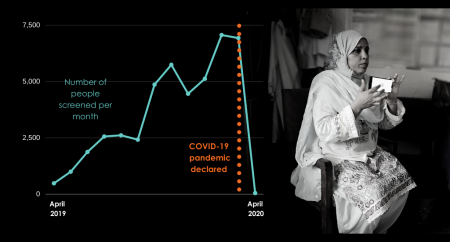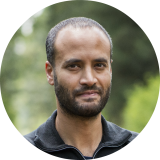
Graph showing how the number of people reached in an eye health programme using Peek technology plunged as the COVID-19 pandemic was declared in April 2020.
Credit: Peek Vision
The graph above says it all. It shows how a community eye health programme using Peek technology has steadily increased the number of people reached through screening in the last year – only to be brought to a standstill by the COVID-19 pandemic.
Eye health services across the world have had similar experiences. It is likely that millions of people have gone without vital treatment for their eyesight in the past few months. As services slowly restart and adapt to the new circumstances, backlogs will be growing ever larger and the need for effective eye health services will be greater.
While health services, government ministries and international agencies assess the longer-term effects of the COVID-19 crisis, one thing is clear – to build a healthier future, we need stronger health systems.
So what does this mean for us?
For me, as a doctor with a lifelong interest in global health, it has been heartening to see the increased attention on health systems strengthening in response to the crisis. But it is important that the COVID-19 crisis and its consequences do not inadvertently contribute to the neglect of other areas of health, including vision.
Losing your eyesight can affect your education, your career and your ability to live a productive, dignified life. Yet over a billion people worldwide are living with preventable or treatable vision problems, simply because they cannot get the care they need.
It is vital that we don’t lose momentum. In recent years the sector has made huge progress in tackling the burden of avoidable vision loss, led by the International Agency for the Prevention of Blindness (IAPB) and movements like VISION 2020. It is within our power to stop the longer-term tragedy of vision loss affecting millions more people in the coming months and years, but only with concerted action today.
Peek has been using the COVID-19 crisis to make some much-needed improvements to our processes and software so that when programmes restart and new partners join us, we can provide them with even better support (from a distance!) to make their patients visible and improve their services.
The pandemic has brought welcome attention to the different ways that technology can improve healthcare, especially in low-resource settings. There is an opportunity now to accelerate implementation of technologies to support better, more equitable health care worldwide.
We will all be dealing with the effects of COVID-19 for a long time to come, but if we don’t address equity in healthcare we will always be holding back millions of people from fulfilling their potential. I believe that it is possible to end avoidable vision loss, but only with bold commitment and a holistic, needs-led approach to eye health.
As some of the programmes using Peek Solutions begin to restart, we are hopeful that this crisis will be an opportunity to work with our partners – old and new – to make sure no one is left behind.
About the author

Dr Andrew Bastawrous is CEO and co-Founder of Peek Vision, and Associate Professor of International Eye Health at the London School of Hygiene & Tropical Medicine. He has worked and undertaken research in over twenty countries, including two years living in Kenya where he led a major eye disease study and the development and testing of Peek.